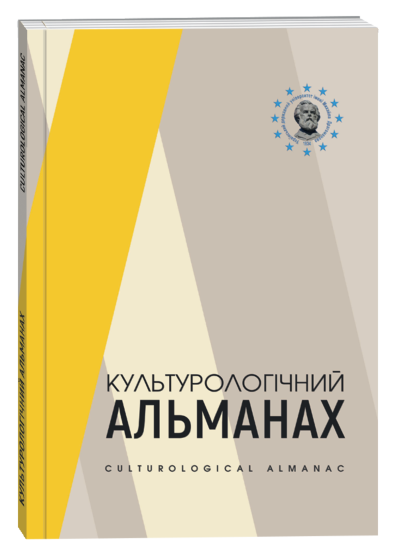VARIABILITY, CULTURAL INVARIANTS AND BASIC UNIVERSALS OF CULTURE
DOI:
https://doi.org/10.31392/cult.alm.2023.2.41Keywords:
culture, cultural universals, cultural invariants, variability.Abstract
The article updates the issue of universals, invariants and variability as conventional «resources» of culture. On the basis of systemic, complex and interdisciplinary approaches, stable elements, that is, cultural universals and variable elements that can appear and disappear in specific historical conditions, have been investigated. It was established that cultural universals reflect the characteristics of cultural experience and are distinguished by the comparative uniformity of features in the most diverse manifestations and have an abstract, symbolic character. It is emphasized that cultural universals are mostly related to values. It was found that cultural invariants are a property or a constant that remains unchanged in various transformations and appear in culture as a unity of the variable and the unchanging. It has been studied that cultural invariants are one of the ways of maintaining and transmitting symbols, myths and archetypes. It was concluded that the cultural invariant is opposed by a variant. The cultural invariant determines the «quality» of a given culture, establishes the boundaries of variability and its semantic manifestations. Accordingly, variability is the mode of existence of culture in time and space and all existing and possible sign and symbolic manifestations of culture, variants of its forms and contents. If invariance is characterized by stability and stereotypy, independence from external influences, preservation of traditions, insufficient flexibility, and orientation towards order, then variability is characterized by flexibility, innovative orientation, openness to everything new, dependence on influences. Variability exists at the same time in the variety of concrete expressions – options.
References
Балута Г. А. (2012) Iнварiанти: реальне чи номінальне? Актуальнi проблеми духовностi: зб. наук. праць. Вип. 13. С. 203–212
Босик З.О. (2010). Родинна обрядовість: трансформація та архетипові мотиви весільної обрядовості Середньої Наддніпрянщини. 344 с.
Brown, D. (2004). Human universals, human nature and human culture. Daedalus, 133 (4): 47–54.
Букач В. М. (2021) Бакланова Н.М Теорія та історія культури (словник-довідник): навч. посіб. для здобувачів вищої освіти. 288 с.
Geertz, C. (1983). Local Knowledge: Further Essays in Interpretive Anthropology. New York: Basic Books. 244 p.
Голубович И. Инваианты и тексты культуры / И. Голубович И. // Δόξα / Докса: URL: https://doxa.onu.edu.ua/ Doxa6/222-230.pdf (дата звернення: 12.06.2023).
Гречанівська П. Варіативність – основа розвитку народних традицій. Новий Акрополь. URL: https://иnewacropolis.org.ua/theses/e731c0f4-6281-4eed-9e27-ce18d365e7a0 (дата звернення: 31.05.2023).
Жулєнова І. Культурні універсалії, інваріантність та еквівалентність: їхня роль у реалізації кросс- національних досліджень. Соціологія: теорія, методи, маркетинг. No 3., 205 с.
Канівець І. (2018) Варіативність у кіно та універсальність кіно мови. Науковий вісник Київського національного університету театру, кіно і телебачення імені І. К. Карпенка-Карого. Вип. 22. 198 с.
Кирилюк О.С. Універсально-культурні структури міфологічних підвалин масової політичної свідомості: Мислене древо. URL:Режим: http://www.myslenedrevo.com.ua/uk/ Sci/Culturology/uvuk/Politics.html.13 (дата звернення: 1.04.2023).
Кирилюк А. С. (1996) Универсалии культуры и семиотика дискурса. Миф. 141 с.
Колесник О. С. (2013) Художня інтерпретація інваріантних образів. Міжнародний вісник: Культурологія. Філологія. Музикознавство, № 1. С. 41–46.
Matsumoto, D. (Ed.). (2001). The handbook of culture and psychology. New York: Oxford University Press, С. 200–218.
Murdock, George Peter. (1959). Africa: Its Peoples and T heir Culture H istory. New York, McGraw-Hill Book Company, Inc., 456 pp., Р. 56–60.
Метельова Т.О. (2010). Культура глобалізованого світу: на шляхах збереження плюралізму. 344 с.
Hills, M. D. Kluckhohn and Strodtbeck's Values Orientation Theory. Online Readings in Psychology and Culture, 4 (4). URL: https://doi.org/10.9707/2307-0919.1040. (дата звернення: 12.06.2023).
Попович М. (2000). Відчуження і цінність. Філософсько-антропологічні читання. Антропологічні ідеали київської школи та реалії постмодерну (до 70-ти річчя Олександра Яценка).С. 42–52.
Семашко О.М., Піча В.М. та ін. (2003). Культурологія: навчальний посібник для студентів вищих навчальних закладів I–IV рівнів акредитації, 314 с.
Sztompka P. (2007). Coming in from the cold: my road from socialism to sociology / M. Deflem, Sociologists in A Global Age, Ashgate, pp. 189–202.
Черниш М. Основні поняття та методологічні принципи культурологічного аналізу проблеми збереження культурного розмаїття. Вісник Національної академії керівних кадрів культури і мистецтв. № 2. С. 90–95. URL: http://journals.uran.ua/visnyknakkkim/article/view/137999 (дата звернення: 10.05.2023).








